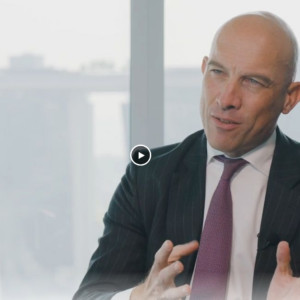
With an already challenging macroeconomic and geopolitical backdrop, the Chinese authorities in Beijing must strive to restore international investor confidence
China is ramping up efforts to strengthen global economic ties. Following president Xi Jinping's visit to San Francisco for the Asia-Pacific Economic Cooperation meeting in November, the Chinese government has continued to emphasise its commitment to fostering international co-operation and openness. Strategic measures and policy shifts have been implemented, setting the stage for a new era of economic collaboration. As 2024 starts off, we believe China can roar during the Year of the Dragon. But first, the country must correctly impose three major measures.
Channelling resources
Although geopolitics and the real estate sector in China continued to weigh on investor sentiment in 2023, significant progress has been made on multiple fronts.
China has demonstrated its ability to manage economic challenges effectively by implementing prudent financial and consumption policies. While problematic leverage issues, which have massively impacted property developers in China, have received significant media attention, there is often less emphasis on the positive side of China’s balance sheet.
China's robust economic foundation is often understated. China has $3tn in reserves, a substantial consumer savings pool, the world's largest consumer market, and an exceptionally low sovereign debt-to-GDP ratio.
China’s low sovereign debt-to-GDP ratio has allowed its government to issue more debt, with little impact on total liability levels, to relieve struggling sectors and local governments. In recent months, China has issued three ‘special bonds’ worth Rmb1tn ($140bn) each. The first was earmarked for new infrastructure projects, the second for real estate developers, and the third to boost market liquidity.
These have positioned China’s local governments with a formidable cash reserve, ready to fund pertinent projects. While these special bonds are not a direct stimulus, they could be a sign that China’s central government is willing to take further steps to ensure economic growth and stability.
The Chinese government has also taken proactive steps to stabilise the consumer property market, recognising its influence on economic growth and investor sentiment. Shenzhen's recent reduction of the down-payment requirement from 80 to 40 per cent for second-home purchasers exemplifies the commitment to stimulate demand in the consumer real estate sector. Regulatory encouragement for banks to increase lending to real estate developers also underlines a proactive approach to provide liquidity in the market to facilitate the recovery.
A potential uptick in credit is a critical aspect to monitor, particularly in ensuring that injected liquidity effectively reaches small and mid-sized enterprises, which are crucial contributors to China's growth. The success of government initiatives hinges on strategic resource allocation, and the coming months will unveil the true impact of these efforts on China's economy.
Navigating the geopolitical landscape
China has emphasised the importance of attracting firms from outside its borders, as Beijing aims to diversify the economy and tap into the expertise and innovation offered by global players. The country is committed to welcoming international businesses and creating a more conducive environment for them. Recent deals, such as Meta's collaboration with Tencent and McDonalds’ increased stake in its China business, indicate a welcoming environment for foreign expertise. The approval of the Mastercard joint venture also heralds a significant step towards integrating Chinese financial markets with the international community.
Regarding international visitors, China recently announced visa-free entry for visitors from seven countries to enhance international travel. This gesture signifies China's commitment to fostering diplomatic and cultural ties on the international stage.
Striking a balancing act
The Politburo and the Central Economic Work Conference (CEWC) meeting held in December offered a clear affirmation of policy support, bolstering investor confidence in the Chinese capital market. The active engagement of president Xi Jinping and high-ranking Chinese policy-makers evidenced the importance of the two-day meeting. During the meeting, a crucial acknowledgment was made regarding the imperative to “overcome challenges” to facilitate a full economic recovery.
This reflects the policy-makers’ awareness of the necessary measures to grow the economy. Notably, the CEWC called for enhancing “counter-cyclical and cross-cyclical policies", highlighting the need for a proactive fiscal and prudent monetary policy. Coordination and co-operation were also focus areas during the conference across various policy domains, including fiscal, monetary, employment, industry, regional, science and technology, and environmental protection.
In 2024, we expect China to maintain a highly supportive monetary policy and strategic fiscal planning. The trajectory for China's economic revival lies firmly in the hands of its policy-makers and their ability to win over global investors. While investor confidence is gradually being restored, this confidence is delicate and leaves little room for policy missteps. Chinese policy-makers must make practical decisions now. Recognising the delicate balance between sustaining positive momentum and avoiding potential setbacks is essential in fostering stability.
China’s economic fundamentals appear attractive relative to other major markets, such as the US, the UK and the eurozone, facing headwinds from higher interest rates, high valuations, and high debt from the Covid-19 pandemic.
Going into 2024, we believe China’s long-term growth story remains intact, as its commitment to global economic integration and strategic domestic measures to stimulate growth continue. However, the government must implement more defined policies that outline key growth areas and capital allocation priorities, to get the market back on track in trading based on fundamentals instead of headline news. As the world watches the developments unfolding in Beijing, the onus is on Chinese officials to ensure policy translates into tangible benefits for the nation and the global economy.

Xiaolin Chen, head of international, KraneShares





